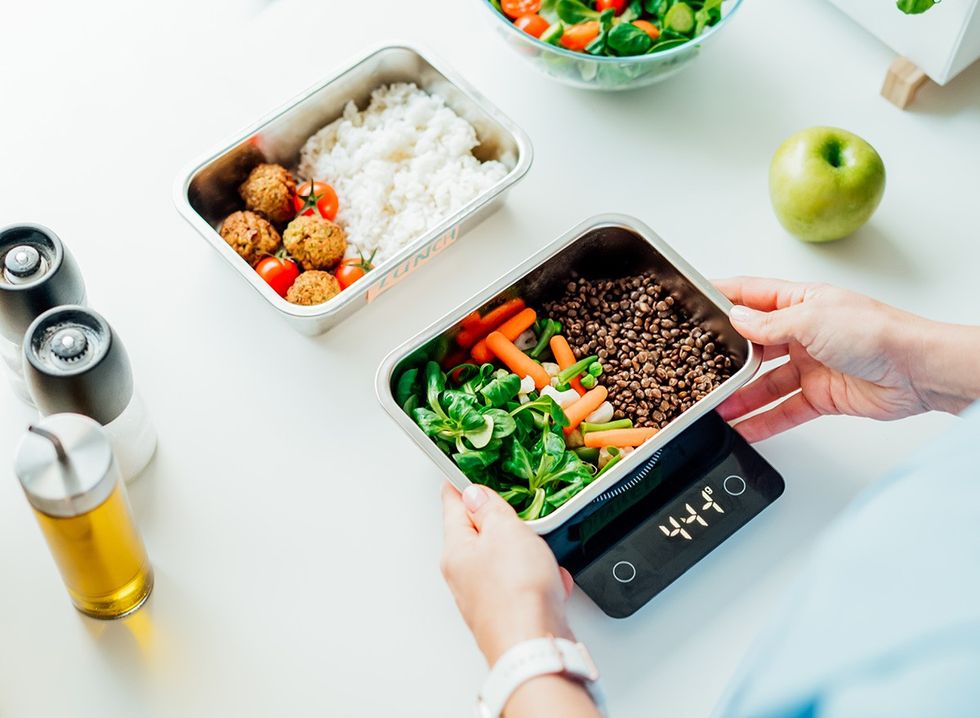Are you dieting but can’t seem to lose weight? You could be eating some of the wrong types of food, according to one expert. Melissa Neil, 5, is a fitness trainer who specializes in working with women over 40 on transforming their bodies and health. Her videos share tips and tricks on fat loss, exercise, hormones and menopause “to get the body you have always dreamed of,” she writes in her YouTube bio. In one viral video she reveals 8 foods that she has given up to lose weight and stay in shape.
Melissa Neil Reveals Tips She Used to Get in Shape
“One of the things I do is I talk about some of the things that have actually helped me get in shape because they're gonna help you and that involves stopping eating certain foods or really limiting them to just the odd occasion only. And I'm gonna talk about the things that I've actually ditched,” she says.
A Big Help for Her Was Ditching 8 Types of Food
“There's some food that I've given up eating altogether, yes,” she says in the clip. “I've had to make sacrifices to get in shape. Now that I've reached over the age of 50, I'm gonna talk about the eight foods I've ditched to get in shape over 50.”
Pizza

First, Melissa avoids Pizza. “I don't eat pizzas when I go out. I avoid them because they've got processed carbohydrates in, they've got a ton of cheese,” she says about the “processed food,” adding it “just doesn't do me any favors.” She claims that ditching it has “really helped maintain my shape.”
Pasta and White Bread

“The second one I'm gonna talk about, nothing wrong with it for young people is pasta,” she reveals. “Again, that's using refined carbohydrate, refined flour. It doesn't do me any favors at this age.” She explains that she is “prone” to insulin resistance, “and so do many women at this stage in life. And if you eat anything with white flour in it, it's just gonna make it a whole lot worse. It's gonna give you a blood sugar spike. It's gonna be really hard to lose weight. The same with white bread.”
Refined Sugar

“The number three food that I've ditched is sugar, refined sugar. I'm not talking about fruit,” she says. “Again, that's just gonna give me a huge insulin spike. Now I've gotta admit like occasionally three or four times a year I'm gonna have a dessert with sugar in it. But believe you me, I don't feel very nice the next day. So I don't eat it all that often.” The only exception? “70% cocoa, dark chocolate, which has got a tiny amount of sugar in it. But because I only eat one or two squares, not gonna have a massive amount of sugar in that.”
Breakfast Cereal

Next up, a “huge” problem: Breakfast cereals. “Again, they are gonna be refined carbohydrates. They are gonna have a ton of sugar in them even if they don't taste that sweet. And so I've ditched them because the other thing is they don't keep you full and satisfied for very long and what you end up doing is kind of feeling hungry an hour later.” Instead she eats oats. “I find they are great because they are whole grains. They keep me full and satisfied for a long time and they are slow releasing carbohydrates. So they're not gonna give me a huge blood sugar spike like some of those other breakfast cereals do.”
Fried Food

Next on the list? Fried food, “especially deep fried food,” she says. “You can see I've got an air fryer here, that's my best friend. I can have things like potato wedges done in the air fryer and they taste amazing, almost as good as fries. So I use that instead of frying my food. And it's only gonna have a minimum amount of spray oil or a tiny bit of oil. So it really helps me stop loading on that fat.”
Fruit Juice

Number six on her ditch list is fruit juice. “I prefer to eat the whole fruit instead. So I'm not anti-fruit. But the problem with fruit juice and juicing is again, it's going to give you an insulin spike and it's much better for your health to have the whole fruit because we need fiber.
And when you eat the whole fruit, it's actually got fiber in it and it's gonna give you less of an insulin spike.” She recommends “anything like bananas, berries, apples,” or “whatever fruit is available to you in this season.”
Soda

Another drink she avoids are sodas “which have loads of sugar in them,” she says. This includes “colas and orange flavored fizzy drinks,” she adds. “You know, you're just gonna load yourself up with calories, but it's not gonna help keep you satisfied and it's gonna give you an insulin spike. So I steer clear of those.”
Alcohol

The last item on her list is alcohol. “I do not drink alcohol at all. I have found my life has completely improved by not having alcohol in it. It doesn't do me any favors as a menopausal woman, it's gonna mess with my hormones,” she explains. She adds that it negatively impacts her sleep, “which is already really difficult at this stage in life” and is also “loaded with calories” and offers zero nutritional benefits. “So if you are thinking of any of those foods on the list, which one to ditch, I definitely say alcohol. You will find that your life improves so much by ditching alcohol.” And if you enjoyed this article, take advantage of these 15 Quick Ways to Lose Body Fat Percentage in a Week.








 Monitor Your Carbohydrate IntakeShutterstock
Monitor Your Carbohydrate IntakeShutterstock 3. Deep-Fried ItemsShutterstock
3. Deep-Fried ItemsShutterstock Shutterstock
Shutterstock Shutterstock
Shutterstock Don’t Eat High-Sugar FoodsShutterstock
Don’t Eat High-Sugar FoodsShutterstock Shutterstock
Shutterstock Shutterstock
Shutterstock









 Shutterstock
Shutterstock Shutterstock
Shutterstock Shutterstock
Shutterstock Shutterstock/sakkmesterke
Shutterstock/sakkmesterke Shutterstock
Shutterstock Shutterstock
Shutterstock Shutterstock
Shutterstock Shutterstock
Shutterstock Shutterstock
Shutterstock Shutterstock
Shutterstock Shutterstock
Shutterstock

 I'm a Nutritionist and These 9 High-Protein Snacks Keep My Clients Full While Losing 50 Pounds
I'm a Nutritionist and These 9 High-Protein Snacks Keep My Clients Full While Losing 50 Pounds
 Shutterstock
Shutterstock 2. Processed FoodsShutterstock
2. Processed FoodsShutterstock Shutterstock
Shutterstock Shutterstock/Prostock-studio
Shutterstock/Prostock-studio Shutterstock
Shutterstock Pro TipsShutterstock
Pro TipsShutterstock Shutterstock
Shutterstock Shutterstock
Shutterstock Shutterstock
Shutterstock Shutterstock
Shutterstock Don’t Drink as Much AlcoholShutterstock
Don’t Drink as Much AlcoholShutterstock Most Women on GLP-1s Are Making a Few Common MistakesShutterstock
Most Women on GLP-1s Are Making a Few Common MistakesShutterstock Soda and Sugary DrinksShutterstock
Soda and Sugary DrinksShutterstock Shutterstock
Shutterstock Eat BreakfastShutterstock
Eat BreakfastShutterstock And Improve Insulin SensitivityShutterstock
And Improve Insulin SensitivityShutterstock Belly Flab Strip Tip: Sugar and Fat Calories Leave Its Mark on Your BodyShutterstock
Belly Flab Strip Tip: Sugar and Fat Calories Leave Its Mark on Your BodyShutterstock Shutterstock
Shutterstock The Drugs Mimic the GLP-1 Hormone Naturally Produced by the BodyShutterstock
The Drugs Mimic the GLP-1 Hormone Naturally Produced by the BodyShutterstock